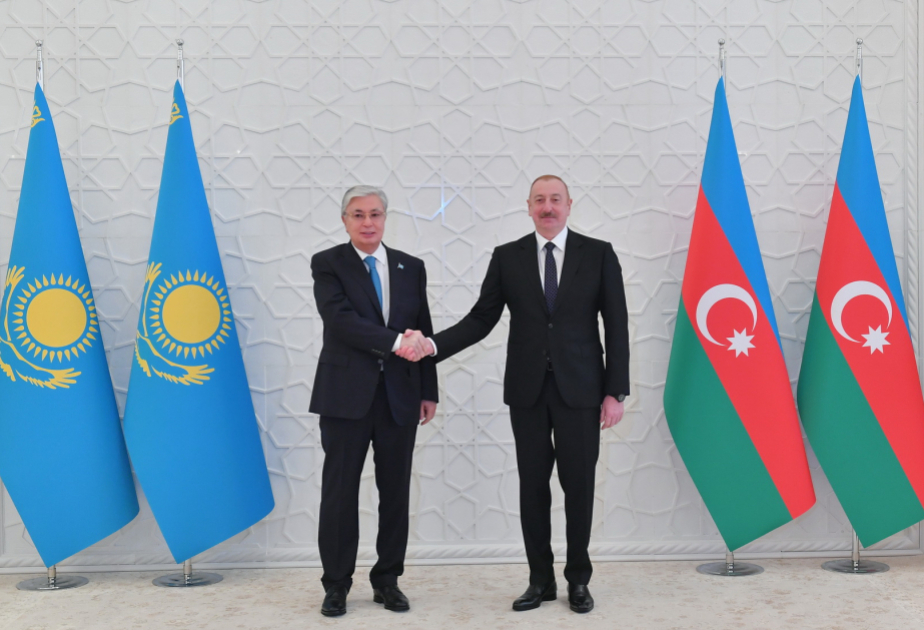BAKU, Azerbaijan, October 19. President Ilham Aliyev's visit to Kazakhstan is expected to set a new dynamic for economic cooperation, independent Kazakh expert on international relations and economic policy Yerik Batyrkhanov told Trend.
“President Ilham Aliyev’s visit can redefine economic partnership, moving it beyond traditional energy and transport frameworks. Relations between Astana and Baku are transitioning from mutual trade to forming a full industrial-investment ecosystem focused on creating added value,” he said.
He drove home the point that logistics and energy are currently the bread and butter of bilateral cooperation, and serving as interconnected engines of progress. Kazakhstan already uses Azerbaijani infrastructure, he said, to export around 1.5 million tons of oil annually, a figure that continues to grow. Joint projects to modernize the Aktau and Alyat ports are laying the foundation for a Caspian hub integrating oil, grain, metals, and container cargo into a unified transport system, transforming both countries from mere transit points into nodes of global supply chains.
“The second dimension is food and agrotechnology cooperation. Record growth in Kazakh grain exports to Azerbaijan exceeded 450,000 tons in 2024 and marks the beginning of a new model, establishing joint processing and distribution centers aimed at the Caucasus and Türkiye. This represents a shift from raw material export to exporting finished solutions,” he said.
The enhancement of digital connectivity is manifesting through
the harmonization of customs data and logistics pathways via the
Digital Trade Corridor framework, thereby catalyzing synergies in
IT infrastructure, telecommunications, and fintech ecosystems.
Batyrkhanov underscored the criticality of ecological
metamorphosis, referencing the Caspian Green Energy Corridor
initiative encompassing Kazakhstan, Azerbaijan, and Uzbekistan,
indicative of the region's shift towards "intelligent energy"
modalities such as wind, solar, and hydrogen power.
“This indicates that President Ilham Aliyev’s visit transcends mere
diplomatic engagement, representing a pivotal moment in the
evolution of systemic partnership enhancement, wherein energy, food
security, digital transformation, and ecological sustainability
converge to establish a cohesive framework for enduring growth,” he
articulated.

He noted that Kazakh-Azerbaijani relations are entering a qualitatively new phase, a strategic partnership based on mutual trust and aligned interests in key regional political and economic matters.
“In recent years, dialogue at the level of heads of state and governments has deepened, trade volumes have grown, and joint investment projects have been launched. Both countries demonstrate similar understanding of regional challenges, including energy security, transport connectivity, and the need to strengthen Turkic integration,” Batyrkhanov added.
He underscored that Kazakhstan and Azerbaijan are establishing a
strategic axis of stability and modernization within the Caspian
and Central Eurasia, translating political trust into concrete
economic outcomes.
“In recent years, the Kazakhstan-Azerbaijan coalition has
transitioned from a merely declarative partnership to a robust and
synergistic alliance. In the fiscal year 2024, the dyadic exchange
of goods and services surpassed the $533 million threshold. Between
January and October 2024, bilateral commerce experienced a robust
expansion of 38.7 percent, culminating in an approximate valuation
of $393.8 million. Azerbaijani outbound trade to Kazakhstan
experienced a significant uptick of 23.2 percent, reaching a total
valuation of $107.7 million. Concurrently, Kazakhstani exports
directed towards Azerbaijan surged by 45.6 percent, culminating in
a robust figure of $286 million,” he stresses.
Batyrkhanov highlighted the current dialogues aimed at
augmenting the Kazakh oil throughput via Azerbaijani corridors to a
target range of 5–7 million tons per annum. In the fiscal year
2023, approximately 1.4 million metric tons of Kazakh crude were
strategically transited through the Azerbaijani corridor. By the
year 2025, throughput through the Baku-Tbilisi-Ceyhan (BTC) conduit
is projected to attain a volume of 1.7 to 1.8 million tons, with
aspirations to escalate to 2.2 million tons. The strategic
objective is to amplify annual transit capacity to 7 million tons
by 2027.
He indicated that throughput metrics along the Trans-Caspian
International Transport Route (TITR / Middle Corridor) connecting
Kazakhstan and Azerbaijan experienced a substantial uptick of 62
percent in 2024, culminating in a total cargo volume of 4.5 million
tons. The Kazakhstan-Azerbaijan Investment Fund has been
inaugurated with a foundational capital infusion of $300 million
earmarked for collaborative ventures.
“These figures demonstrate that cooperation now exceeds rhetoric – it has become an instrument of economic growth, logistical diversification, and energy autonomy. The Middle Corridor is no longer just an alternative route but a strategic axis for new Eurasian transit, with Kazakhstan and Azerbaijan playing key roles,” Batyrkhanov explained.
He noted that by the end of 2024, freight traffic along the Trans-Caspian International Transport Route (TITR) had surged by 62 percent, reaching 4.5 million tons, with roughly half of that volume consisting of Kazakhstani exports. Today, the route connects over 20 logistics and port operators across Kazakhstan, Azerbaijan, Georgia, and Türkiye. Thanks to tariff harmonization and the implementation of electronic clearance systems such as eTIR and the Digital Trade Corridor, transit times have been halved, dropping from 38 to 19 days.
Batyrkhanov emphasized that the corridor's capacity is evolving
in the context of the current paradigm shift in global logistics
frameworks. Per projections from the TITR, the annual freight
tonnage is anticipated to surpass the 10–12 million ton threshold
by the year 2030, positioning it to compete with the cargo handling
capacities of prominent Black Sea ports.
“Kazakhstan and Azerbaijan are positioning themselves as pivotal
actors in this paradigm shift. The Aktau and Alat ports are
synergizing to establish a cohesive logistics nexus within the
Caspian Sea, incorporating specialized transshipment facilities
tailored for hydrocarbons, cereals, ferrous and non-ferrous metals,
as well as intermodal containerized freight. In the extended
temporal framework, the Middle Corridor has the potential to
metamorphose both nations into epicenters of an emergent
transcontinental economic paradigm, wherein velocity of transit,
digital integration, and operational predictability, superseding
mere geographical distance, emerge as the pivotal determinants,” he
noted.
He underscored that for both nations, this transcends a mere
transportation initiative; it epitomizes a pivotal advancement
toward economic autonomy and the reintegration of Eurasia under
contemporary, strategic paradigms.
In reference to the Zangezur Corridor, Batyrkhanov articulated
that it presents the potentially most efficient terrestrial conduit
connecting the Caspian basin to Türkiye, thereby constituting an
essential component for the comprehensive actualization of the
Trans-Caspian logistics framework.
“For Kazakhstan, this initiative embodies substantial logistical
and fiscal importance. Should the Zangezur Corridor be
operationalized, the transit pathway for Kazakh freight originating
from the Aktau and Kuryk ports to Turkish and European markets
stands to be optimized by an estimated 600–700 km. Furthermore,
logistics expenditure, as per expert analysis, is projected to
diminish by a margin of 10–15 percent,” indicated Batyrkhanov.
He noted that the Kazakhstan-Azerbaijan-Georgia-Türkiye corridor is
presently functioning with operational efficacy; however, specific
segments are susceptible to bottlenecks and limitations in
throughput capacity.Batyrkhanov stressed that the optimal approach
for Kazakhstan is to implement the Zangezur Corridor in a
multilateral, open framework, integrating it into the unified TITR
network. In this scenario, Zangezur would serve as a natural
extension of Caspian logistics, enhancing the transport autonomy of
Central Asia.
“In a broader perspective, this is more than a transport initiative; it represents an opportunity to connect the Eurasian arc from the Altai to the Mediterranean, with Kazakhstan and Azerbaijan serving as strategic bridges between regions and cultures,” he said.
The expert further highlighted that the partnership between Kazakhstan and Azerbaijan within the Organization of Turkic States (OTG) has become the backbone of Turkic integration. This is not merely symbolic; it reflects practical collaboration between two economically and politically mature nations, shaping the strategic direction of the organization.
“Kazakhstan was at the forefront of promoting Turkic unity. In 2009, it spearheaded the agreement establishing the Cooperation Council of Turkic-Speaking States, which later evolved into the OTG. From the outset, Azerbaijan acted as a key promoter and infrastructure hub. Today, it is Baku and Astana that ensure the sustainability and substantive agenda of this organization,” Batyrkhanov said.
Economically, the two countries form a link that could become a “locomotive” for Turkic integration. Their combined GDP exceeds $300 billion, and they account for over 60 percent of Turkic energy exports. Main transit corridors, Caspian, Middle Corridor, and Trans-Anatolian, pass through them.
“The political and humanitarian dimension is equally important. Kazakhstan and Azerbaijan emphasize modernizing the Islamic and Turkic world through education, digitalization, green economy, and international partnership. This gives OTS a modern and constructive character, distinct from classical interstate unions. Strategically, the Astana-Baku alliance within OTS fosters a new architecture of cooperation in Eurasia, positioning the Turkic world as an influential center between Europe, Russia, China, and the Middle East,” Batyrkhanov said.
He articulated that the forthcoming Kazakhstan-Azerbaijan
business forum will catalyze targeted initiatives.
“For both nations, it is crucial to not only amplify trade
throughput but also to enhance the collaborative framework –
transitioning from mere commodity transactions to integrated
production, logistics, and technological ecosystems.” This is
accomplished via direct engagements among corporate entities,
developmental institutions, and governmental bodies,” Batyrkhanov
articulated.
He observed that antecedent assemblies yielded accords valued in
the hundreds of millions of dollars, encompassing initiatives for
hydrocarbon logistics, cereal conveyance, harbor enhancement, and a
collaborative investment vehicle approximating $300 million.
“At the forthcoming symposium, the emphasis will pivot towards
direct business-to-business agreements within the sectors of
agribusiness, energy, information technology, and sustainable
economic practices.” Engagement in collaborative knowledge transfer
among export-centric enterprises will be pivotal for penetrating
tertiary markets in Türkiye, Europe, and the Middle East,” he
mentioned.
Batyrkhanov emphasized that the business forum also has a reputational function, demonstrating that Kazakhstan-Azerbaijan economic partnership is based on private sector trust, not just government decisions, enhancing investment attractiveness and establishing a new culture of business interaction across the Caspian region.







